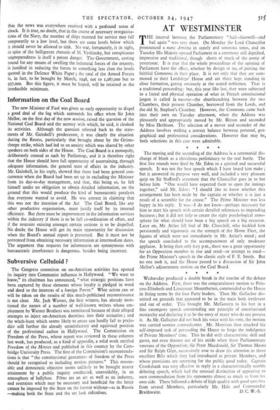Subversive Celluloid ?
The Congress committee on un-American activities has opened its inquiry into Communist influence in Hollywood. " We want to know," its chairman has announced, " what strategic positions have been captured by these elements whose loyalty is pledged in word and deed to the interests of a foreign Power." What action can or will be taken on the results of this much-publicised reconnaissance is not clear. Mr. jack Warner, the first witness, has already men- tioned the names of a number of well-known writers whose em- ployment by Warner Brothers was terminated because of their alleged attempts to inject un-American doctrines into their scenarios ; and the witch-hunt which seems likely to ensue can hardly fail to preju- dice still further the already unsatisfactory and equivocal position of the professional author in Hollywood. The Commission on Freedom of the Press, whose report was reviewed in these columns last week, has produced, as a kind of appendix, a solid work entitled Freedom of the Movies and published in this country by the Cam- bridge University Press. The first of the Commission's recommenda- tions is that " the constitutional guarantees of freedom of the Press should be recognised as including motion pictures." This reason- able and democratic objective seems unlikely to be brought nearer attainment by a public inquiry conducted, unavoidably, in an atmosphere of ballyhoo. Films are an art as well as an industry, and restraints which maybe necessary and beneficial for the latter cannot be imposed by the State on the former without—as in Russia —making both the State and the art look ridiculous.
































 Previous page
Previous page